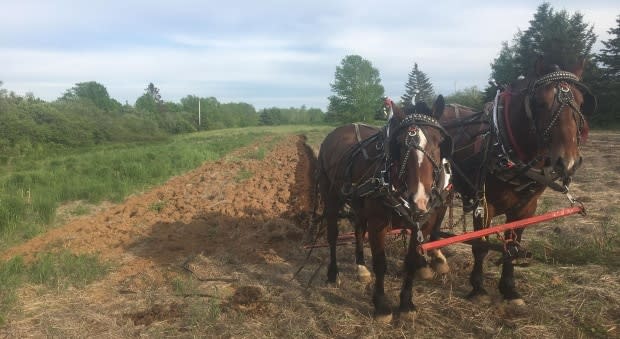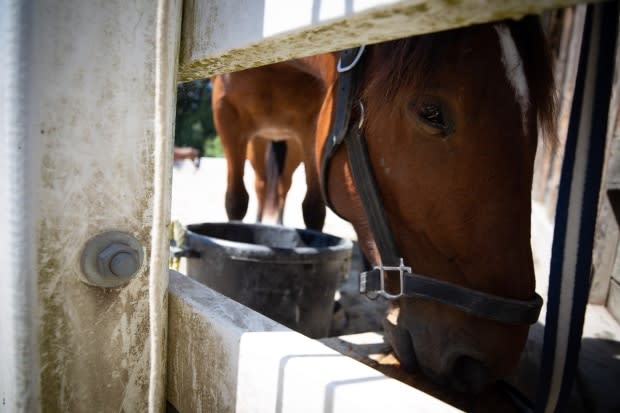How workhorses in Canada are slowly becoming a thing of the past
When Basil Oickle started up his horse-and-buggy business 25 years ago, he could easily find a strong workhorse that would cost him between $800 and $1,200.
Now, that same horse could cost him $5,000, and it took him nearly two years to find the horse he most recently bought.
Oickle says he's alarmed about declining numbers of workhorses — also known as draft horses or dray horses — in Canada.
"Back in 1970, when I was just a boy, between Nova Scotia and Prince Edward Island and New Brunswick, we had over half-a-million-strong workhorses in the Maritimes," said Oickle, who runs Trot in Time in Lunenburg, N.S.
"You won't find 2,500 of them today."

Oickle said he's spoken with a number of horse associations across the Maritimes who report similar concerns about workhorse numbers.
Workhorses are large horses bred to do physical tasks like plowing, logging and other farm labour. The three main types of workhorses found in Canada are Clydesdales, Percherons and Belgians.
Percherons in steep decline
The decline of workhorses can be seen across the country.
According to data from the Canadian Livestock Records Corporation, the number of newly registered purebred Percherons has dropped dramatically in recent years, plummeting by 64 per cent between 2002 and 2018.
The data was less dramatic for Clydesdales, whose numbers have gone up and down, but ultimately dipped by 30 per cent in the same time period.

These numbers were provided to the livestock records group by the Canadian Percheron Association and the Clydesdale Horse Association of Canada.
The corporation doesn't have the numbers for Belgian horses, but the Canadian Belgian Horse Association has numbers on its website dating back to 2014. While the number of registered horses has actually increased by 26 per cent in the past four years, membership for the association has dropped by 30 per cent.
The declining numbers might be a sign of changing times. After all, farms no longer rely on horses to pull tractors or harvest crops.
Cody Atwood, president of the Western Nova Scotia Draft Horse Association, believes that's one reason fewer people are owning and working with horses.
"A lot of the people that did do it are older, and they've either died or have gotten out of it — like retired — or just their horses got old," he said.
"I know a lot of people in their 70s or 80s, and they didn't buy another pair because they didn't want to go through the hassle of breaking in another pair of foals, so they kind of just phased out of it."

Oickle, who's in his 60s, is soon to be one of them. After his initial interview with CBC News, he recently announced that he's looking to sell Trot in Time.
"My time has come as I am not 35 anymore," he said in a Facebook message.
'They're pets, too'
Atwood is one of the younger people involved in raising and working with horses. At 23, he said most of the other people he knows who work with workhorses are middle-aged or older.
He said he uses them for plowing, hauling wood and other farm work. He's also involved with the Annapolis Valley Exhibition.
There are benefits to using a horse for farm work, he said. While they might not work as quickly as modern equipment, they can offer a way for farmers to further connect to the work they're doing — and they can also provide companionship.
"I don't just pull them, I don't just use them for farm work. They're animals, too. They're pets too," he said.
"On a day that I don't use them… I still pet them, I still brush them, I still bath them, I still clean them out. You can't really get connected to a piece of machinery."

An expensive hobby
It's not just about farming, since many workhorses are also used in exhibitions and competitions.
In a phone interview from Ontario, Bill Stokes, vice-president of the Canadian Percheron Association, said people may be giving up horses because of the high cost that comes with keeping them.
He's been a member of the association for 50 years, and he has also seen a drop in recent decades.
"It's a very expensive hobby. To me, it's not a lack of interest in the young people. It's the cost of it," said Stokes, who both competes in and judges horse competitions.
"Feed's up, vet's up, buying the quality of horses you need to compete is drastically up."
Decades ago, he said the service fee for breeding a mare to somebody's stud was $25. Now, it's between $600-$800.
He estimates it costs at least $5,000 per year to care for a horse — and that's a "bare bones" figure.

Stokes also said there's a "nasty part of the business" where some horses are being exported to Japan for meat, which is also driving prices up.
He said he's trying to keep his own horse numbers down because of the costs. But he said the high prices aren't keeping him away entirely.
"Horses are kind a way of life," he said. "My father did it before me, and my kids are all very active in showing, too. So it's just kind of what we do."
The end of a long tradition
While it may be a natural response to changing economy and technology, the decline of workhorses in Canada saddens Oickle, who worries that work horses may eventually become a thing of the past — and centuries-long traditions may be forgotten.

He said he strongly disagrees with concerns raised over the years from animal rights activists who worry about working conditions for horses. He said physical activity is good for workhorses, who are bred specifically to handle heavy loads.
He also said he doesn't think people are talking about the issue of declining workhorse numbers enough.
"It's getting to the point that people don't even care. And that's the scary part. No one cares," he said.
"And if people don't care... these horses are going to go extinct."
MORE TOP STORIES


